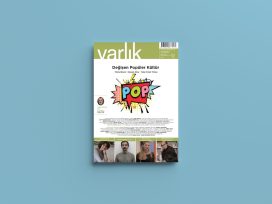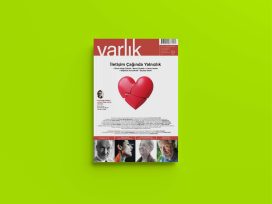Living the Future of the Past
Did America change after the 11th September?
September 11th, when it came, promised to change the world. A year later, New York who is trying to see the meaning of this change of its own face. How has life changed since then? How does the new one differ from the old? What kind of future have we arrived at?
There has always been a character that represented New York best. A person that is wiped out, that is invisible, a perfect observer, the one who would pay attention not to get involved in things, the one who always stays out, a watchman who keeps his hands always clean. He walks around dressed to kill still while still blending in all the way. He walks around dressed in his ethnicity which becomes his perfect mask. His clothes are his best disguise. He becomes nobody, with no face. He becomes one of the million men of attitude. He is the ultimate city folk. This type proved himself as the oracle of the future. The future which was written before September 11th. The future which was engrained in the past. Now this future has arrived and it is his time. He has not eaten in a restaurant for eight years. He did not watch any television. For him the television “is a manipulative piece of shit.” He listens to music only if it is live, directly coming from the instruments while it is happening. Even the recording does interpret, attempting to influence. In his house, he keeps a NATO filtered gas mask, a radiation meter, an inflatable sea boat, two hand held lambs that work with sun energy and a radio, some iodine pills, a thousand dollars cash. He does not depend on electricity. He does not use the telephone. He does not buy food from supermarkets. He keeps living high protein sources at hand. He carries a bag that is full of antibiotics, first aid and a knife. His house is empty. It is empty as if no one lives in it. If you pass through it, you will not notice a thing: “I like to have a house with no significance, no one could take me seriously” he says. He hides his weapons in his house. His weapons are on the border of legality, their names are not to be mentioned. He has chosen some “neutral” centers in the city that will be useful during self defense.
He will survive in the chambers of hell. He is prepared. He can adjust quickly. He is universal. He is the ultimate city man. Like the characters of “the Maus” drawn by Art Spigelman, who tell the story of survivors who survived the unsurvivable. Like the Bosnians who did their daily grocery shopping under sniper fire. They run carrying their water bottles, ducking their head down, crossing the streets under flying mad bullets. Like the people of Istanbul, who live in a city waiting for a devastating earthquake. They hide a hand held lamb, a knife and a bottle of water under their bed, ready for use. Like the story told in Zimbabwe about the frog who does not jump out while the water is heated one degree at a time until it boils and kills him.
To get used to the most extreme and survive through it, was, after all, the character of the human race that became the first sign of future that was engrained in the past. History often races with the human’s ability to adjust as the clouds clear over the verge of extermination. Finally, New York arrived at such a future. This future was expressed with past tense in the novels of Utopia. After hopeful settlers arrived to the new world, nuclear socialism became the fear of future. With nuclear jihad, it is now the fear of past. Paranoia overwhelmed the dream. And finally it is the very possibility of dreaming that scares us. Is it possible to sleep with the threat of such dreams? Is it possible to dream?
I am reminded of the words of Frederik L. Polak, the Dutch sociologist and utopian philosopher who wrote not long ago for the catalog of an exhibition about utopia at the New York Public Library: “If Western man now stops thinking and dreaming the materials of new images of the future and attempts to shut himself up in the present, out of longing for security and for fear of the future, his civilization will come to an end. He has no choice but to dream or to die, condemning the whole of Western society to die with him.”
Is this why all the writers surrendered to journalism after the September 11th? Did they give up dreaming? The writer of “the War Against Cliche”, Martin Amis confirms this fear in his article that was published in Harper’s magazine: “After a couple of hours at their desks on September 12, 2001, all the writers on Earth were reluctantly considering a change of occcupation. I remember thinking that I was like Josephine, the opera-singing mouse in the Kafka story: Sing? “She can’t even squeak.”
A novel is politely known as a work of the imagination: and the imagination, that day, was of course fully commandeered-and to no purpose. Whenever that sense of heavy incredulity seems about to dissipate, I still find, an emergent detail will eagerly replenish it: the pink mist in the air, caused by the explosion of the falling bodies, the fact that the second plane, on impact, was traveling at nearly 600 mph, a speed that would bring it to the point of disintegration. (What was it like to be a passenger on that plane? What was it like to see it coming toward you?)
An unusual number of novelists chose to write journalism about September 11 – as many journalists more or less tolerantly noted. I can tell you what those novelists were doing: they were playing for time. The so-called work in progress had been reduced, overnight, to a stream of pitiful babble. … Imaginative writing is understood to be slightly mysterious. In fact it is very mysterious. A great deal of the work gets done beneath the threshold of consciousness, without the intercession of reason. But this time, politics -once defined as “what is going on” – suddenly filled the sky. True, novelists don’t normally write about what’s going on: they write about what’s not going on..”
A word coined in 1516 by Thomas More, “utopia” was originally a pun, meaning both a good place and no place. No place is a perfectly good place, More implied. Utopia began from this pessimistic assumption, and one could argue that it has remained on some level a negative idea. Utopias inevitably slouch toward dystopias. Utopia is a concept against dreaming. It is nagging about humans shortcomings of the perfect. It is the future in the past. Just like today’s New York started living its future in the present tense.
Published 3 October 2002
Original in Turkish
Translated by
Sebnem Senyener
Contributed by Varlik © Varlik eurozine
PDF/PRINTNewsletter
Subscribe to know what’s worth thinking about.



